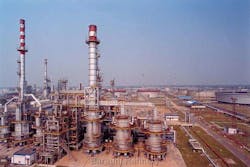Indian Oil lets contracts for new units at Barauni, Haldia refineries
Indian Oil Corp. Ltd. (IOC) has let contracts to McDermott International Ltd. to provide engineering, procurement, construction, and commissioning (EPCC) services for separate projects involving the addition of new units at two of its refineries in India.
As part of the first contract, McDermott will deliver EPCC for implementation of a new diesel hydrotreating unit and associated installations to be added as part of IOC’s project to increase crude oil processing capacity at its 6-million tonne/year (tpy) Barauni refinery in Begusarai District, Bihar, McDermott said on June 14.
Under the second contract, McDermott will execute EPCC for a catalytic dewaxing unit to improve quality and production capacity of lubricant base oils at the operator’s 8-million tpy refinery in Haldia, Purba Medinipur, West Bengal, India.
Alongside EPCC services, McDermott’s scope of work under the projects—both of which are scheduled to begin by the end of June—also includes project management, residual process design, detailed engineering, fabrication, transportation, and mechanical completion.
The service provider did not reveal a value of the EPCC contracts.
Barauni expansion overview
Officially approved in 2020, the 148.10-billion rupee Barauni refinery expansion will increase crude processing capacity by 3 million tpy to 9 million tpy as well as add downstream polymer units at the site as part of IOC’s strategy to help meet growing domestic demand for petroleum products in India (OGJ Online, Aug. 3, 2020).
According to the latest project documents available from IOC, India’s Ministry of Environment, Forest, and Climate Change (EFCC), and Envirotech East Pvt. Ltd.—which completed the project’s environmental impact assessment study in November 2018—the Barauni capacity expansion will include construction of the new 9-million tpy atmospheric-vacuum distillation unit (AVU) to replace the refinery’s three existing AVUs, which will be idled (OGJ Online, Apr. 8, 2020).
Alongside addition of the new 1.2-million tpy diesel hydrotreating unit, the project also entails installation of major grassroots units, including:
- Two new sulfur recovery units, each with a capacity of 80 tonnes/day.
- A new 304,000-tpy isomerization unit.
- A new 360,000-tpy NHDT unit designed to treat naphtha feed moving specifically to the isomerization unit.
- A new 1.2-million tpy diesel hydrotreating unit.
- A new 61,000-tpy hydrogen generation unit.
- A new 1-million tpy once-through hydrocracking unit.
- A new 562,000-tpy propylene recovery unit.
- A new 200,000-tpy polypropylene unit.
- A new 390,000-tpy LPG treatment unit.
- A new 880,000-tpy naphtha splitting unit.
- A new 500-tonnes/hr amine recovery unit.
- A new 220-tonnes/hr sour water stripping unit.
- A new 6,178-kg/hr flue gas amine treating unit.
The expansion project also will involve revamps and upgrades to increase capacity of current units at the refinery, including:
- Expanding the refinery’s existing 210,000-tpy naphtha hydrotreating (NHDT) and catalytic reforming combined capacity to 300,000 tpy.
- Expanding capacity of the existing 1.4-million tpy residue fluid catalytic cracking unit to 1.7 million tpy.
- Expanding capacity of the existing 500,000-tpy Coker B to 662,000 tpy (OGJ Online, Apr. 7, 2021).
The Barauni crude processing capacity expansion currently remains on schedule for commissioning by April 2023, IOC told investors in a May 19, 2021 presentation.
Haldia unit overview
Part of India’s commitment to produce cleaner fuels, the Haldia catalytic dewaxing unit—which, once in service, will be the refinery’s second—comes as part of IOC’s capacity augmentation of its Bharat Stage VI (BS-VI, equivalent to Euro 6) plant to produce low-sulfur fuels and help reduce India’s current reliance on imports of lube base oils (OGJ Online, Feb. 8, 2021).
First proposed in 2016, the catalytic dewaxing unit at Haldia will be equipped to produce 100% premium API Group III base oils by processing unconverted oil from an upstream hydrocracking unit at the refinery. The unit also will have the capability to produce API Group II base oils, as well as white oil and transformer oil as specialty products, according to a series of IOC official project documents filed with Indian regulators.
Granted final environmental clearance to proceed by India’s EFCC on Jan. 5, 2021, the catalytic Isodewaxing unit will include construction of new off-site and auxiliary installations, as well as a new piping system to interconnect the grassroots unit to existing units at the refinery, according to project documents.
In a 2019 description of the proposed project, IOC said the Haldia refinery currently operates a 200,000-tpy catalytic Isodewaxing unit for production of API Group II base oils.
The now 10.19-billion rupee (formerly 9.67-billion rupee) second catalytic Isodewaxing unit is scheduled for startup by January 2023, IOC said in May 2021.
About the Author
Robert Brelsford
Downstream Editor
Robert Brelsford joined Oil & Gas Journal in October 2013 as downstream technology editor after 8 years as a crude oil price and news reporter on spot crude transactions at the US Gulf Coast, West Coast, Canadian, and Latin American markets. He holds a BA (2000) in English from Rice University and an MS (2003) in education and social policy from Northwestern University.

